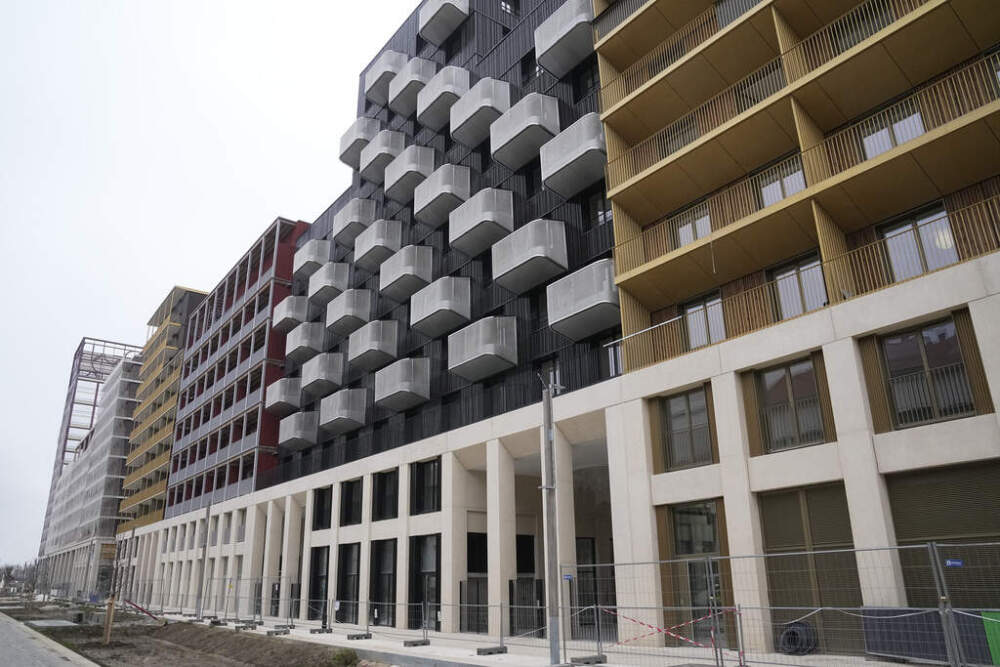Advertisement
Commentary
I love my air conditioning. But it’s complicated

On a hot summer day six years ago, my life changed forever when I brought my newborn daughter home from the hospital. Yes, becoming a parent was a transformative experience. But another thing happened that day: workmen finished installing our central air conditioning system, and artificially chilled air wafted through the iron grates in our Victorian home in Dorchester for the first time. My summer being pregnant in a perpetually hot house became a summer caring for a baby in comfort.
Looking back on that time now, I see that the 20 years or so that I’ve lived in Boston can be divided into two eras: before and after central air.
In the first era, I lived in a series of apartments across the city (Coolidge Corner, North End, South End, Porter Square, Jamaica Plain) and finally the house in Dorchester. Each was defined by the summer ritual of finding someone to help heft a cumbrous box unit into the window, then huddling in the one or two rooms that were cooled, angling fans strategically and falling asleep to the steel wheeze from the window.
In that era, humidity seemed to drip from the walls, my towels never dried and the floors were perpetually sticky. And because I worked for many years as a freelance journalist, my home was also my workplace. In one attic apartment I had no choice but to sweat over my keyboard much of the summer in various states of undress. I didn’t realize how unhealthy it was until I came down with a flu and noticed how cool and pleasant the room finally felt as my body burned with a fever.
This is the conundrum of living in a warming world: those who can will adapt, but adapting can leave us increasingly untethered from reality.
When my husband and I moved into the house in Dorchester, its hollow walls made us acutely aware of temperature swings. With help from the Mass Save program, we insulated the walls and attic, added mini-split units in the top floor and installed the central air conditioning system on the bottom two floors. The post-AC era has been radically different. It still gets warm in our house — we use a smart thermostat to keep the house in an energy-efficient temperature range and avoid over-cooling during times of peak demand — but I no longer experience the dramatic heat and suffocating humidity I once did. Once we close the windows and turn the system on for the season, it tends to stay on all summer.
During one of this summer’s heat waves, a friend who lives without central air asked me how I was handling the heat. It hit me then: I was handling it just fine. In fact, I hadn’t thought about it too much. And that realization disturbed me.
Advertisement
After all, this July gave us four days with the hottest recorded global temperatures in human history. Average global temperatures have begun surpassing a critical threshold of 1.5 degrees Celsius (2.74 degrees Fahrenheit) of warming since preindustrial times, a threshold that the international Paris climate agreement is designed to stay below to avoid catastrophic climate impacts. The six summers since we got central air have included some of the warmest months in Boston's history. Nights in New England, which historically have brought relief during hot humid summers, have been warming even faster.
I know all of this. I spend much of my time thinking and teaching about the impacts of climate change and how we are responding to it. But it’s also true that these last air-conditioned summers have been the easiest I've experienced since moving to Boston. This is the conundrum of living in a warming world: those who can will adapt, but adapting can leave us increasingly untethered from reality.
I used to feel Boston summers in ways I don’t anymore. I was more aware of when the blanketing heat was punctured by a sea breeze
I used to feel Boston summers in ways I don’t anymore. I was more aware of when the blanketing heat was punctured by a sea breeze. I noticed which nights brought cool relief and when the heat seemed to radiate from the sidewalks. Now, my air conditioning at home is just one of the ways I avoid the great outdoors in summer. On hot days, we tend to drive more, shuttling from one cool space to another. My daughter's school cancels outdoor recesses. We ditch playgrounds for museums. Barbecues become indoor dinners.
This lifestyle is well known to people who live in even hotter places like Florida, where air conditioning swallows up more than a quarter of home energy use. But as more of us adopt an air-conditioned lifestyle in places that once didn’t require it, we face a larger moral question: How can we properly respond to a warming world that we don’t personally experience?
Air conditioning only exacerbates the problem it’s meant to alleviate. It has a tremendous environmental impact, using an estimated 7% of the world's electricity and emitting more than 3% of its greenhouse gases, including from refrigerants that are themselves potent contributors to climate change. In some cases, waste heat from air conditioners even exacerbates the outside temperatures in dense urban areas. The World Economic Forum estimates that air conditioning could cause as much as .9 degrees Fahrenheit of additional warming this century. When we seek air-conditioned spaces, we tend to walk less and drive more, leading to further emissions.

It's important to acknowledge that air conditioning improves well-being and even saves lives: it has been responsible for a dramatic decline in heat-related deaths in this country and elsewhere. A far greater percentage of the world’s population will need access to air conditioning to stay alive and healthy in the future. At the 2024 Paris Olympics, when organizers decided to eschew AC in athlete housing in favor of a more environmentally friendly geothermal temperature control system, they sparked an outcry and a compromise that let countries ship thousands of window units for their athletes, a solution that was neither environmentally friendly nor equitable.
As the use of air conditioning increases, we’ll see more discussions and debates about the ethics of artificial cooling and the need for greater thermal equity. Those of us with access to air conditioning can take steps to use it ethically. But we can also find ways to (safely) stay connected to the outdoors, even if it’s just taking a walk to the store, finding a shady place to eat outside, or ditching AC for open windows in my car and house when the temperature and humidity drop, as I started doing during the cooler reprieve this August.
It’s worth making ourselves a little less comfortable in an uncomfortable world.
